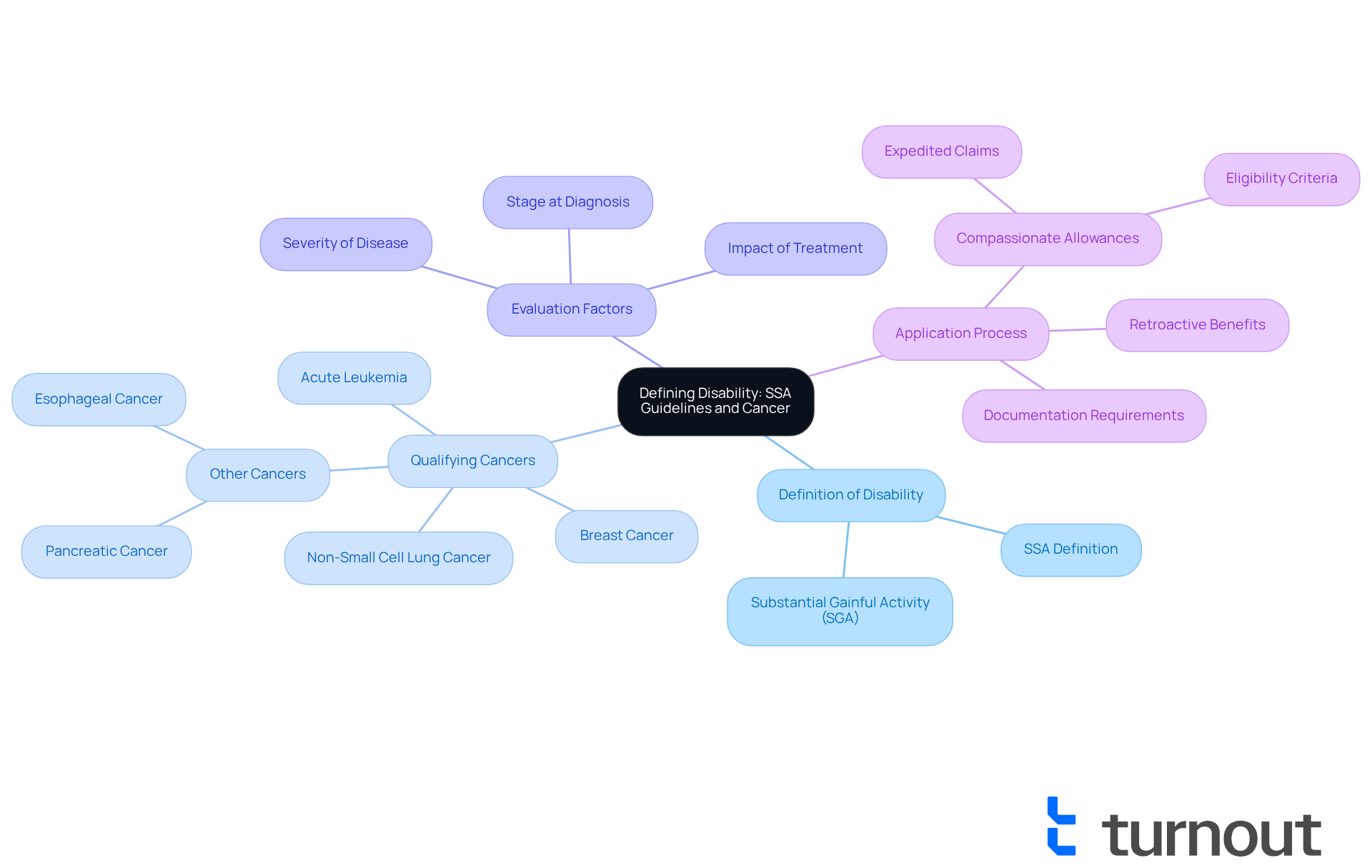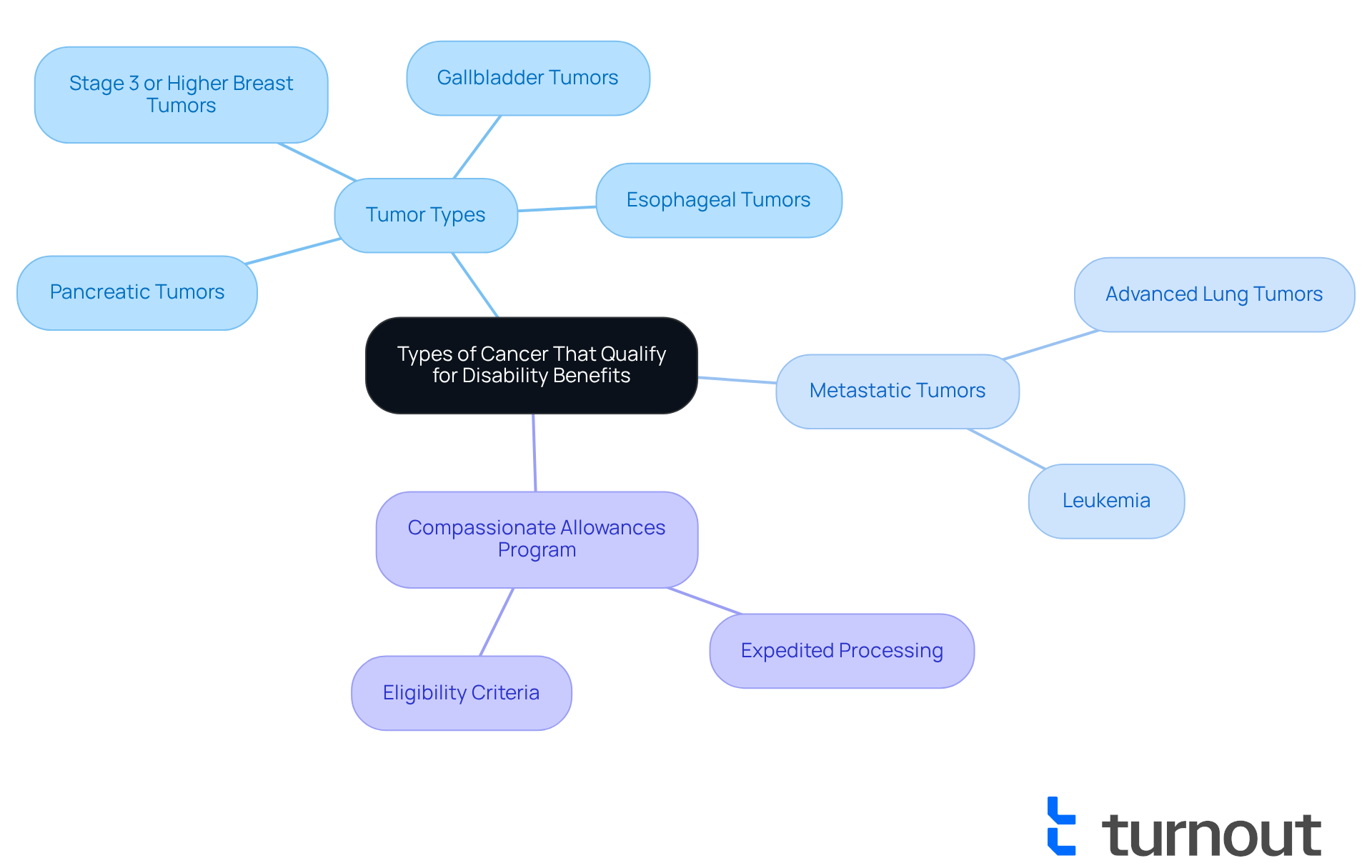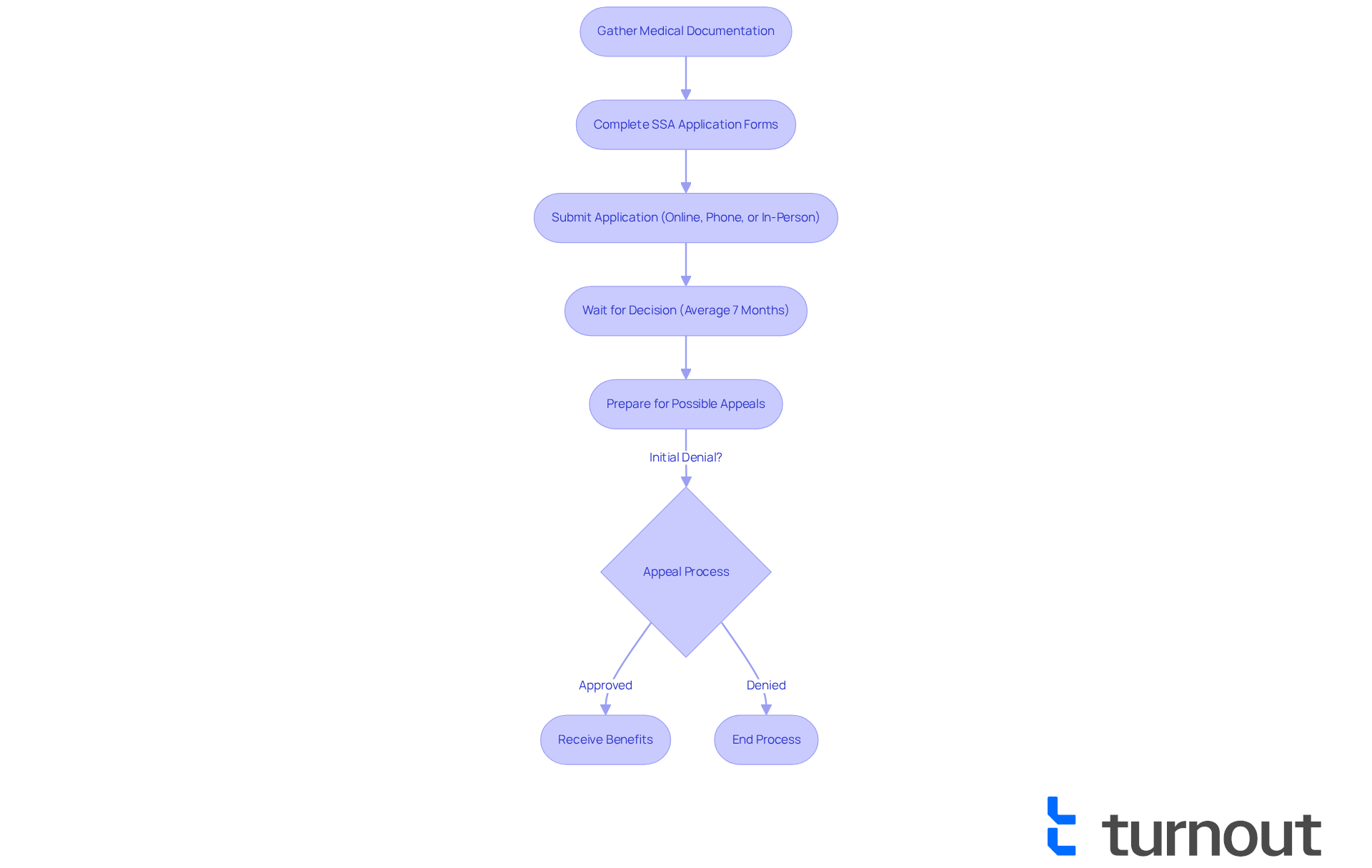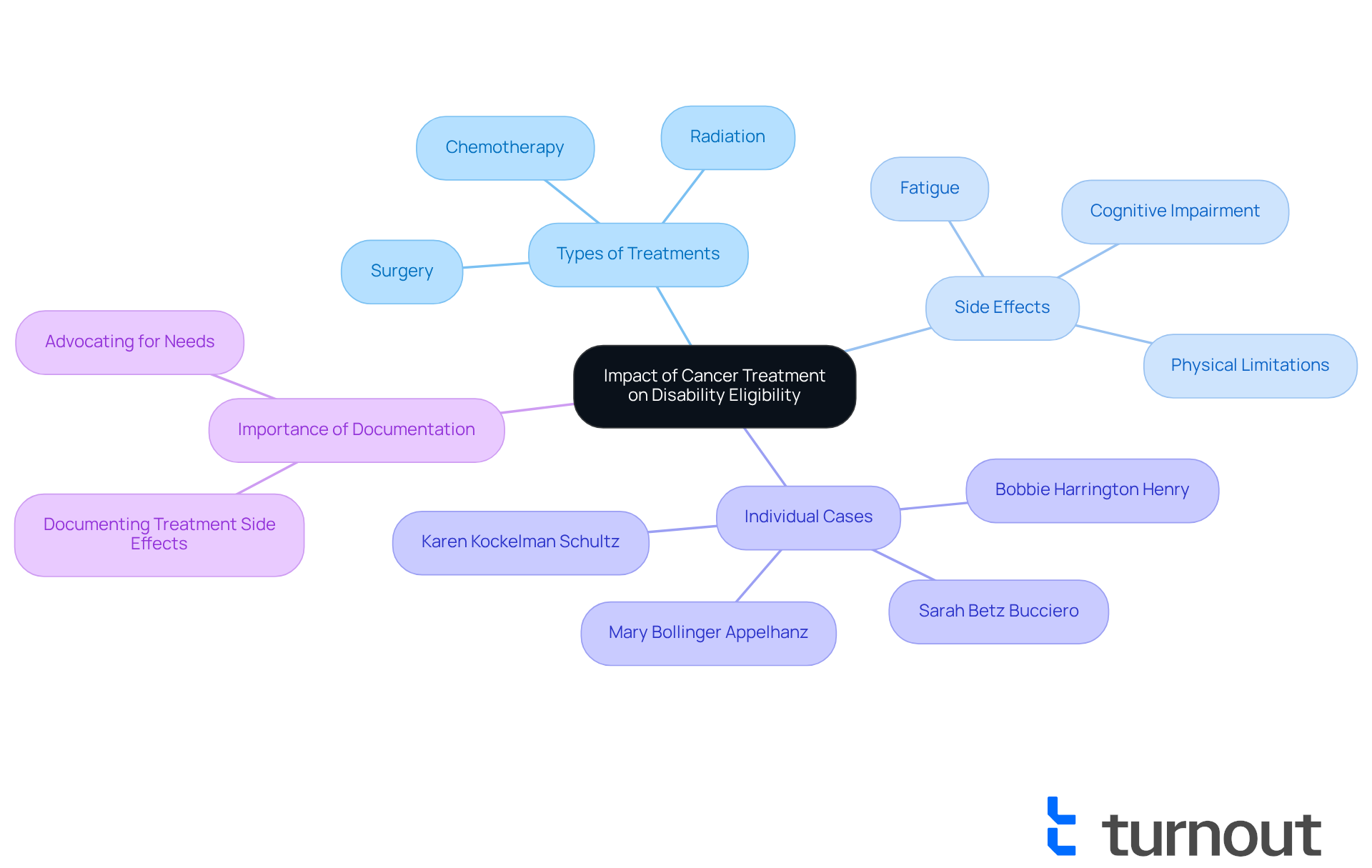Overview
If you or a loved one is facing a cancer diagnosis, it’s important to know that certain types of cancer can qualify for disability benefits. These include:
- Acute leukemia
- Breast cancer
- Non-small cell lung cancer
- Advanced tumors like pancreatic and esophageal cancers, as outlined by the Social Security Administration (SSA).
We understand that navigating this process can be overwhelming, but these cancers meet specific criteria for disability due to their severity and impact on daily life.
Thorough medical documentation is key to supporting your claims under the SSA’s Compassionate Allowances program, which allows for expedited approval. Remember, you are not alone in this journey. We’re here to help you through the process and ensure you receive the support you need during this challenging time.
Introduction
Navigating the complexities of cancer and its impact on daily life can feel overwhelming. We understand that the thought of applying for disability benefits adds another layer of stress. The Social Security Administration (SSA) has established specific criteria to determine which types of cancer qualify for assistance, offering a vital lifeline to those grappling with severe illness. However, many individuals remain unaware of the nuances in the application process and the critical documentation required to substantiate their claims.
What challenges do patients face in securing these benefits? It's common to feel lost in the paperwork and unsure of where to begin. Understanding the SSA's guidelines can empower you to overcome these obstacles. Remember, you are not alone in this journey, and we’re here to help you navigate these challenges with confidence.
Defining Disability: SSA Guidelines and Cancer
Disability, as defined by the Social Security Administration (SSA), is the inability to engage in any substantial gainful activity due to a medically determinable physical or mental impairment. This definition is particularly relevant for patients with tumors, as various malignancies can significantly impact one's ability to work. We understand that this can be a challenging time, and the SSA has specific guidelines to evaluate what types of cancer qualify for disability. They focus on factors such as the severity of the disease, the stage at diagnosis, and how treatment affects an individual's functional abilities.
For instance, what types of cancer qualify for disability under the SSA's Compassionate Allowances program include:
- Acute leukemia
- Breast cancer
- Non-small cell lung cancer
These conditions can lead to expedited claims approval, allowing patients to receive support more swiftly. In 2025, the SSA's Compassionate Allowances list expanded to include 300 conditions, reflecting a commitment to assist those facing severe medical diagnoses.
It's common to feel overwhelmed by the process. The SSA also considers the date of initial reported symptoms and the specifics of the medical condition when determining the onset dates for impairment. This means individuals may be eligible for assistance retroactively for up to 12 months before their diagnosis, provided they can substantiate their claims with thorough medical documentation.
Grasping these guidelines is essential for patients pursuing aid, as they outline the necessary documentation and medical proof needed for a successful application. In 2025, the average monthly SSDI payment for disabled workers is anticipated to increase to $1,580. This highlights the importance of managing the application process efficiently, ensuring you receive the financial assistance you need during difficult times. Remember, we’re here to help you through this journey.

Types of Cancer That Qualify for Disability Benefits
Some forms of tumors can be particularly challenging, often meeting the criteria for assistance due to their seriousness and impact on daily life. We understand that navigating these health concerns can be overwhelming. The Social Security Administration (SSA) identifies what types of cancer qualify for disability, including conditions such as:
- Pancreatic tumors
- Esophageal tumors
- Gallbladder tumors
- Stage 3 or higher breast tumors
Additionally, tumors with distant metastases, including advanced lung tumors and leukemia, represent what types of cancer qualify for disability support.
The Compassionate Allowances (CAL) program plays a crucial role in this process, accelerating the approval for these serious conditions. This means that individuals diagnosed with gallbladder malignancy can benefit from faster processing due to its inclusion on the CAL list. It's common to feel anxious about the wait, but this program is especially vital for aggressive tumors, significantly reducing wait times for approval—often leading to decisions made within just 10 to 14 days.
Understanding what types of cancer qualify for disability can greatly influence your ability to secure essential financial assistance during treatment. The SSA assesses each case individually, considering how the illness and its treatment affect work capabilities. Therefore, comprehensive medical documentation is essential to illustrate how the condition impacts daily activities and overall health. Remember, you are not alone in this journey; we’re here to help you navigate these challenges and find the support you need.

Navigating the Application Process for Cancer-Related Disability Benefits
Applying for disability benefits due to a serious illness can feel overwhelming. We understand that taking this step involves several essential actions that can seem daunting. First, it’s important to gather comprehensive medical documentation that confirms your diagnosis and details the extent of your condition. This includes treatment records, pathology reports, and statements from healthcare professionals about what types of cancer qualify for disability and how they affect your ability to work.
Next, you will need to complete the Social Security Administration's (SSA) application forms, which can be submitted online, by phone, or in person. Providing accurate and thorough information is crucial; it helps to avoid delays in processing. Currently, the average wait time for a decision on disability claims has risen significantly, averaging over seven months. It's common to feel anxious about this timeline.
Moreover, be prepared for the possibility of appeals, as many initial applications are rejected. In fact, only around 35% of claims were accepted upon initial assessment in 2022. Understanding the nuances of the application process can greatly enhance your chances of receiving timely benefits. For instance, having robust medical documentation can clarify what types of cancer qualify for disability, leading to faster approvals since applicants with strong records are more likely to meet the SSA's strict eligibility criteria.
Real-world examples show that individuals who effectively gather and present their medical information often navigate the system more successfully. This underscores the importance of thorough preparation in your application process. Remember, you are not alone in this journey. Turnout is here to support you. While we are not a law firm and do not provide legal advice, we utilize trained nonlawyer advocates to assist clients with SSD claims. We ensure that individuals with cancer can navigate the complexities of the application process with confidence, without the need for legal representation.

Impact of Cancer Treatment on Disability Eligibility
The impact of cancer therapy on an individual's health and ability to work can influence what types of cancer qualify for disability assistance programs. Treatments like chemotherapy, radiation, and surgery often lead to severe side effects, such as fatigue, cognitive impairment, and physical limitations. When evaluating claims for impairments, the Social Security Administration (SSA) considers what types of cancer qualify for disability. For example, an individual may qualify for benefits if severe side effects hinder their ability to perform fundamental work tasks, even if their illness is in remission. It’s essential for individuals to carefully document these treatment-related limitations, as they play a crucial role in the SSA's assessment of impairment status.
Statistics show that many individuals with cancer experience long-term side effects that can affect their daily lives. One inspiring case is that of Karen Kockelman Schultz, who, despite a grim prognosis, thrived for over ten years by focusing on her uniqueness rather than her statistics. This perspective can uplift those navigating the complexities of disability claims.
Oncologists often stress the importance of acknowledging treatment side effects in relation to disability claims. They remind us that individuals should not underestimate the impact of fatigue and cognitive challenges on their work capacity. As one oncologist expressed, 'The effects of treatment can persist long after the illness is gone, and it’s crucial to advocate for yourself during this process.'
Real-life stories highlight the challenges faced by those dealing with illness. For instance, Bobbie Harrington Henry recounted how a stranger's encouraging words during her husband's battle with aggressive non-Hodgkin lymphoma reminded them to 'never give up HOPE.' Such support can be vital as individuals document their experiences and seek the benefits they deserve.
Ultimately, understanding what types of cancer qualify for disability and their connection to treatment side effects and disability eligibility is essential for patients. By documenting their experiences and advocating for their needs, they can navigate the system more effectively and secure the support necessary for their recovery and well-being.
Turnout is not a law firm and does not provide legal advice. We employ trained nonlawyer advocates to assist clients in understanding the documentation needed to support their SSD claims effectively. Our services are designed to help individuals navigate the complexities of SSD claims, particularly for those affected by cancer.

Conclusion
Understanding the types of cancer that qualify for disability benefits is crucial for individuals navigating the complexities of the Social Security Administration (SSA) guidelines. We understand that this journey can be overwhelming, and knowing which conditions are eligible for assistance can make a significant difference. By familiarizing yourself with the SSA's Compassionate Allowances program and the specific cancers that qualify, you can better advocate for your needs during this challenging time.
Key insights reveal that cancers such as:
- Acute leukemia
- Breast cancer
- Advanced lung tumors
are recognized by the SSA as conditions that may warrant expedited disability claims. It’s common to feel uncertain about the process, but thorough medical documentation can support your claims and potentially lead to retroactive benefits. Understanding the application process, including the importance of documenting treatment effects, can greatly influence your chances of receiving timely assistance.
Ultimately, securing disability benefits can feel daunting, but it is essential to remain informed and proactive. By effectively gathering medical evidence and understanding the nuances of your condition, you can navigate the application process with greater confidence. Remember, seeking support from knowledgeable resources can help ensure that you receive the benefits you deserve, allowing you to focus on your health and recovery. You are not alone in this journey, and we’re here to help.
Frequently Asked Questions
What is the definition of disability according to the Social Security Administration (SSA)?
Disability, as defined by the SSA, is the inability to engage in any substantial gainful activity due to a medically determinable physical or mental impairment.
How does cancer impact the ability to qualify for disability under the SSA?
Various malignancies can significantly impact an individual's ability to work, and the SSA has specific guidelines to evaluate which types of cancer qualify for disability based on factors such as the severity of the disease, the stage at diagnosis, and the effects of treatment on functional abilities.
What types of cancer qualify for disability under the SSA's Compassionate Allowances program?
Types of cancer that qualify include acute leukemia, breast cancer, and non-small cell lung cancer. These conditions can lead to expedited claims approval.
How many conditions are included in the SSA's Compassionate Allowances list as of 2025?
As of 2025, the Compassionate Allowances list includes 300 conditions, reflecting the SSA's commitment to assist those facing severe medical diagnoses.
Can individuals receive retroactive assistance for disability claims?
Yes, individuals may be eligible for assistance retroactively for up to 12 months before their diagnosis, provided they can substantiate their claims with thorough medical documentation.
What is the anticipated average monthly SSDI payment for disabled workers in 2025?
The average monthly SSDI payment for disabled workers is anticipated to increase to $1,580 in 2025.
Why is understanding SSA guidelines important for patients pursuing aid?
Understanding these guidelines is essential as they outline the necessary documentation and medical proof needed for a successful application, helping patients manage the application process efficiently and receive financial assistance during difficult times.




